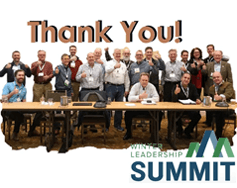Archives: News
News and reviews
CEO Peer Group #1 Meets in St. Louis
GBA developed a Peer Group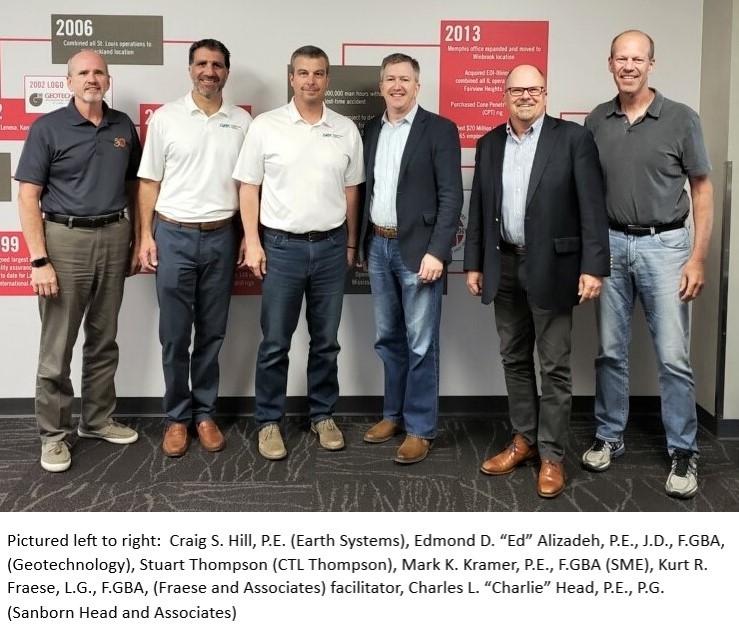 discussion platform where small groups of Member-Firm executive leaders meet to candidly address their most pressing issues and draw on the experience of others who’ve faced similar situations. The first Peer Group held their second meeting at Geotechnology’s office on April 25-26 in St. Louis.
discussion platform where small groups of Member-Firm executive leaders meet to candidly address their most pressing issues and draw on the experience of others who’ve faced similar situations. The first Peer Group held their second meeting at Geotechnology’s office on April 25-26 in St. Louis.
The meeting format is that one of the participants hosts the group for a two-day,noon to noon discussion at their office location. The host chooses a primary business issue to discuss on Day One. Two additional topics are chosen by the other participants and are discussed on Day Two. A facilitator keeps the group on topic and on schedule. The meeting content and details are kept confidential in accordance with an agreement between participants.
The Group Members confirmed the program is providing significant value to their firms in a uniquely GBA way.
If you are interested in forming or participating in a Peer Group, please contact Rich Johnson (rjohnson@bskassociates.com), GBA Peer Review Committee Chair or Joel Carson, GBA’s Executive Director.
2019 Spring Conference Videos Now Available On-Demand!
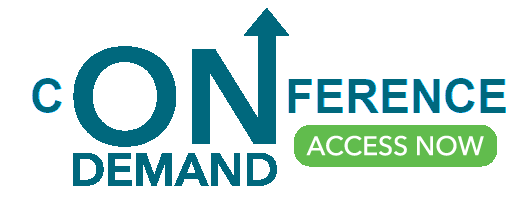 Those that attended GBA’s 2019 Spring Conference in Wailea, Hawaii agreed that the presentations were educational, entertaining, and inspiring. Now you can watch, listen to, and learn from these speakers, too, on your own schedule, and without leaving your office.
Those that attended GBA’s 2019 Spring Conference in Wailea, Hawaii agreed that the presentations were educational, entertaining, and inspiring. Now you can watch, listen to, and learn from these speakers, too, on your own schedule, and without leaving your office.
As added value to all members, GBA records all presentations at our twice annual conferences and makes them available to all through our on-demand platform.
These videos make great lunch-and-learns for professional development of small groups or your entire staff.
The presentations include:
EDDIE WOULD GO
Stuart Holmes Coleman (Writer, Speaker, Eco-Advocate)
Stuart Holmes Coleman is a nationally acclaimed writer, speaker, and environmental organizer. He is also the author of Eddie Would Go: The Story of Eddie Aikau, Hawaiian Hero.
WE ARE GOLDEN: GBA’S 50-YEAR JOURNEY IN SERVICE TO GEOPROFESSIONALS
Kurt R. Fraese, L.G., F.GBA (Fraese and Associates, LLC)
In celebration of GBA’s 50th year, Kurt provides a retrospective
of our organization’s history and milestones. 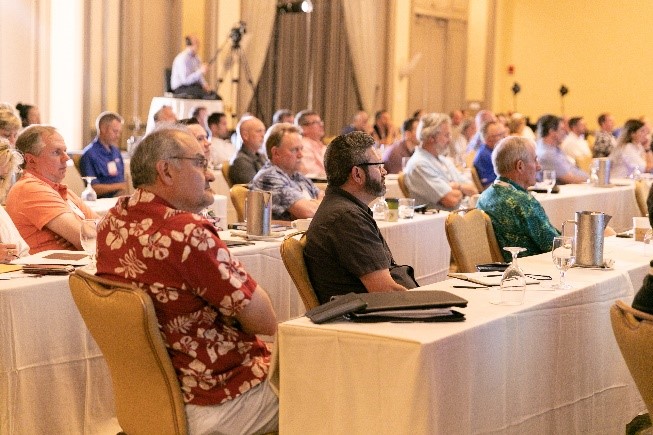
BUSINESS SNAPSHOT SUMMARY
Steven K. Noble, P.E., PTOE (DOWL)
This annual presentation includes the results of our survey, that will give you a brief but meaningful look at how your firm and region are performing relative to the rest of the nation.
THE POWER OF PEER REVIEW
Gary M. DeJidas, P.E, MBA (GAI Consultants, Inc.)
This presentation explores the question, “What makes Peer Review such a powerful tool for today’s business environment?”
HARD CONVERSATIONS: THE DESTRUCTIVE POWER OF CONFLICT AVOIDANCE AND THE
REDEMPTIVE POWER OF HONESTY
Aaron J. Mann, Esq. (Terracon) and Michael J. Yost, Esq. (Terracon)
Review of a painful year-long journey into the mind and work product of a former employee who was willing to do nearly anything (including forging a site closure letter) to avoid confrontation.
OUR JOURNEY FROM RED TO BLACK INK
Martin LaRoche, P.Eng. (SNC-Lavalin)
Martin joined SNC-Lavalin in May 2015 with the objective of rebuilding in a very different market. Within 3.5 years, SNC-Lavalin became profitable again, and the company’s culture, operations, and business development improved.
GBA’S LIVING TIMELINE: PAST PRESIDENTS PANEL
Moderator: Thomas W. Blackburn, P.E., G.E., F.ASCE (Blackburn Consulting)
Panelists:
• Richard A. Millet, P.E., F.GBA (AECOM)
• Laura R. Reinbold, P.E., F.GBA (Terracon)
• Gerald J. Salontai, P.E., F.GBA (Salontai Consulting Group, LLC)
• Edward Wilson, P.E., F.GBA (L. Edward Wilson and Associates, Inc.)
THE QUADRUPLE BOTTOM LINE & THE QUEEN OF ALOHA
Stuart Holmes Coleman (Writer, Speaker, Eco-Advocate)
Stuart Coleman returns to challenge us to improve our leadership and company performance through the Quadruple Bottom Line.
IMPROV FOR ENGINEERS: SCARED SCRIPTLESS
Nancy Watt (Nancy Watt Communications)
As firms manage risk and uncertainty in constantly changing and challenging environments, the critical component to success remains effective communication and collaboration. See why this talk has been rated in the top five leadership workshops at Microsoft’s INSPIRE Global Conference for the past four years.
TERM LIMITS FOR LEADERS: STRATEGICALLY PLANNING A LEADERSHIP TRANSITION
William E. Hadge, P.E. (GZA GeoEnvironmental, Inc.)
One of the most important decisions any firm makes is who will lead and how long they will lead. Explore the benefits and risks of term limits for a strategic leadership transition.
PERCEPTION IS REALITY: THE IMPACT OF YOUR CORPORATE CULTURE
Helen Pappas, CHMM (Gannett Fleming, Inc.) and Victor S. Barchers, P.E. (Kleinfelder, Inc.)
We say company culture is critical, but what is it? How is it defined? How does your company culture – or the perception of it – affect your ability to win work, recruit top talent, and retain your best staff?
BEING NOSTRADAMUS: FORECASTING THE FUTURE FOR BUSINESS SUCCESS
Guy Marcozzi, P.E. (Duffield Associates, Inc.)
You don’t need to outrun the lion; just the other guy. If we ignore thinking about the future or, worse yet, assume that tomorrow will be just like yesterday, then we will be just like everyone else. This presentation will help you predict the future and take the actions needed based on your forecast of what lies ahead.
WHAT IT TAKES TO BE EXTRAORDINARY
Eric Saperston (Live in Wonder)
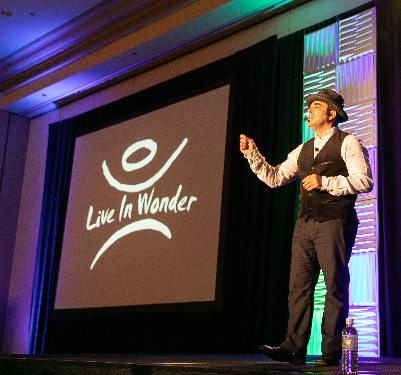 Eric Saperston has spent the last 25 years cold calling and taking the most powerful people in the world out for a cup of coffee (all from a VW bus with his dog tagging along). Eric’s wisdom, humor, and inspiration will wow you while you learn the common traits, motivating factors, and guiding principles he discovered in these people, and how they can enable everyday people to produce extraordinary results.
Eric Saperston has spent the last 25 years cold calling and taking the most powerful people in the world out for a cup of coffee (all from a VW bus with his dog tagging along). Eric’s wisdom, humor, and inspiration will wow you while you learn the common traits, motivating factors, and guiding principles he discovered in these people, and how they can enable everyday people to produce extraordinary results.
Watch Videos and download presentation handouts are available now: Watch Videos
NEW! Business Brief – Salary History Inquiries a Thing of the Past
GBA Legal Affairs Committee
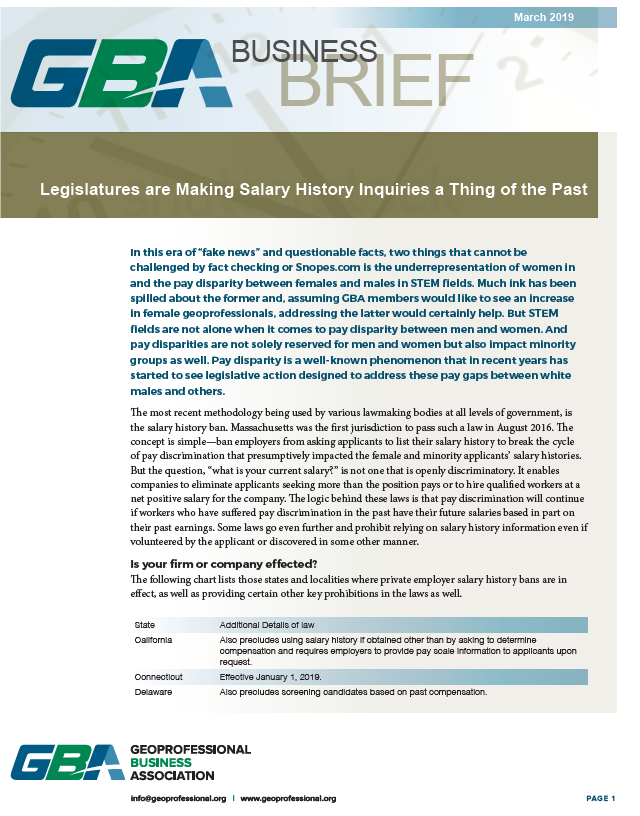
In this era of questionable statistics, two things that cannot be challenged by fact checking or Snopes.com is the underrepresentation of women and the pay disparity between females and males in STEM fields.
Much ink has been spilled about the former and, assuming GBA members would like to see an increase in female geoprofessionals, addressing the latter would certainly help. But STEM fields are not alone when it comes to pay disparity between men and women. And pay disparities are
not solely reserved for men and women but also impact minority groups as well. Pay disparity is a well-known phenomenon that in recent years has started to see legislative action designed to address these pay gaps between white males and others.
Updated: Best Practice E-communication
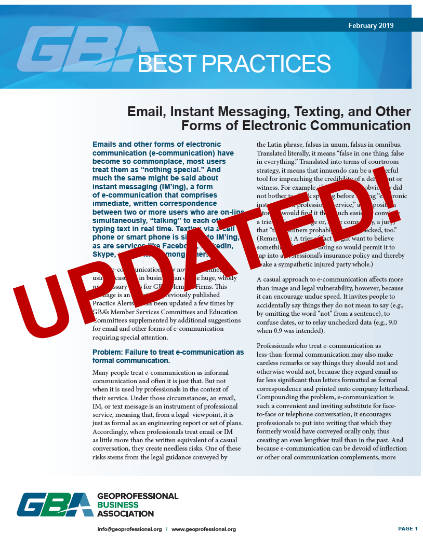
GBA Business Practices & Legal Affairs Committees
Communication is critical to the success of any business. As our communication methods change to include an increasing reliance on e-communication, it is important for us to understand potential problems and solutions to those problems. This GBA Best Practices covers e-mail, and a wide variety of newer communication platforms you and your employees use regularly to help you manage risk and optimize
business performance.
This GBA Best Practices replaces Practice Alert 46 which focused on e-mail. It is revised to address recent usage and offers more suggestions to the problems. As its title suggests, covers e-mail, instant messaging texting, and the use of Facebook, Skype, Twitter, and so on. It is organized as a series of five problems, each accompanied by suggested solutions. The five problems are:
• failure to treat e-communication as formal communication,
• considering e-communication impermanent,
• thinking some employees are not affected,
• overreliance on e-communication, and
• failure to develop or enforce an effective e-communication policy.
Each problem is accompanied by a series of suggested responses.
Annual Awards Presented at Spring Conference
During GBA’s 2019 Spring Conference Annual Awards  Dinner, exceptional member firms and volunteer leaders were recognized for their engagement, support, and volunteer efforts. In total, over 40 individuals were recognized and four Member Firms.
Dinner, exceptional member firms and volunteer leaders were recognized for their engagement, support, and volunteer efforts. In total, over 40 individuals were recognized and four Member Firms.
2018-2019 Member Engagement Awards
For those firms who had the highest measured engagement in GBA during our 2018-2019 year.
GBA Member Engagement Awards were given to:
- GeoProfessional Innovation Corp.
- Earth Systems
- SME
- Terracon
Award of Excellence: Kimberly F. Morrison, P.E., R.G.
In recognition of her meritorious leadership and achievement culminating in the publication of: GBA’s PROPOSED BEST PRACTICES FOR THE ENGINEER OF RECORD (EOR) FOR TAILINGS DAMS
2018-2019 President’s Award: Kurt L. Fraese, L.G., F. GBA
In recognition of his many extraordinary contributions to GBA throughout the year.
2018-2019 Certificates of Appreciation
In recognition of those who contributed to the overall success of GBA during the 2018-2019 year, Certificates of Appreciation were presented to:
Victor S. Barchers, P.E. (Kleinfelder, Inc.)
Michael Byrne, Esq. (Byrne & O’Neill, LLP)
Dan Cassidy, CPG (SME)
Michael Covert, P.G. (Terracon)
Louise D’Amico (BSK Associates)
Gary M. DeJidas, P.E. (GAI Consultants, Inc.)
Michael D. Dodd, Esq. (Shannon & Wilson, Inc.)
Victor Donald, P.E. (Terracon)
Pat Donovan, P.E. (Geotechnology, Inc.)
Richard Ecord , CIH, CSP (GZA GeoEnvironmental, Inc.)
David Faulkner, P.E. ( Faulkner Engineering Services, Inc.)
Bryan C. Field, P.E. (Braun Intertec Corporation)
Dan Gradishar, P.E. (GeoCapitol Engineering LLC)
William E. Hadge, P.E. (GZA GeoEnvironmental, Inc.)
Daniel L. Harpstead, P.E., F.GBA (Kleinfelder, Inc.)
Gregory Hebeler, Ph.D., P.E. (Golder Associates Inc.)
Kevin B. Hoppe, P.E., F.GBA (NTH Consultants, Ltd.)
Lee James, C.P.A., C.M.C., F.GBA (Lee James & Associates)
June Jewell, CPA (AEC Business Solutions, LLC)
Richard Johnson, P.G., C.E.G., C.H.G. (BSK Associates)
Paul Kohler, P.E. (S.W. Cole Engineering, Inc.)
Paul Lampe (Raba Kistner Consultants, Inc.)
Martin LaRoche, P.Eng. ( SNC-Lavalin, Inc.)
David Lourie, P.E., D.GE, F.GBA (Lourie Consulatnts)
Michael J. Marasa, P.E. (Hayward Baker, Inc.)
Aaron J. Mann, Esq. (Terracon)
Guy Marcozzi, P.E. (Duffield Associates, Inc.)
Jay Martin, P.E., F.GBA ( WOOD)
Randy Martin, P.E. (S&ME, Inc.)
Richard A. Millet, P.E., F. GBA (AECOM)
Matt Moler, P.E. (S&ME, Inc.)
Steve Noble, P.E., PTOE (DOWL)
Helen Pappas, CHMM ( Gannett Fleming, Inc.)
Laura R. Reinbold, P.E., F.GBA (Terracon)
Gerald J. Salontai, P.E., (Salontai Consulting Group, LLC)
Terence “Terry” Scanlan, Esq., (Skellenger Bender)
Daniel Schaefer, P.E, CHMM (Froehling & Robertson, Inc.)
Daniel F. Schneider, P.E. (Terracon)
Leo Titus, P.E., ( ECS, Ltd.)
Woody Vogt. P.E., D.GE, F.ASCE, F. ACI, F.ASTM (Paradigm Consultants, Inc.)
Steve Wendland, P.E, R.G., D.GE ( Kleinfelder, Inc.)
Edward Wilson, P.E., F. GBA (L. Edward Wilson and Associates, Inc.)
Jim Withiam, Ph.D., P.E., D.GE, F.GBA (D’Appolonia Engineering)
Michael Yost, Esq. ( Terracon)
Congratulations to all the award winners and thank you to all who contributed to our successful year.
It Was Golden! 2019 Spring Conference Highlights
Aloha! GBA held its 2019 Spring Conference at the Grand Wailea Resort, Wailea, Hawaii, April 4-6. Participants and their guests totaled over 200, our largest recorded attendance for a conference. We were joined by 19 first time attendees including a professor and a student from the University of Hawaii. The event marked the beginning of a year-long recognition of GBA’s 50th Anniversary. The conference theme of “Celebrating Our Foundation, Building Our Future” set an ideal framework for honoring our 50 years of service to geoprofessionals in our 50th State.
The conference began with a philanthropic event where almost 50 
conference participants and guests demonstrated GBA’s spirit of volunteerism in a cleanup of Po’olenalena Beach in association with the Surfrider Foundation.
GBA also made a significant donation to the Surfrider Foundation’s
mission of dedication in the protection and enjoyment of the world’s oceans, waves and beaches for all people, through conservation, activism, research and education. Energized GBA committee meetings followed our wonderful morning of giving back to the community.
Executive Director Joel Carson shared the appreciation letter GBA received from Governor David Ige of Hawaii, honoring our important work and welcoming the Association to the islands.
It was clear from the conference proceedings that GBA is running strong as we begin our next 50 years. President Woody Vogt reported GBA has recorded its third straight year of budget surplus. This provides the  association the opportunity to prepare for the future by replenishing in our reserve fund. Our growing financial strength is underscored by the positive view our members have of the current economy. An instant poll of the participants on the topic of business climate described the overall feeling of members as “optimistic” and “busy,” with 60 percent anticipating increases in revenue over the next year. Members expressed that their biggest 2019 challenge was the recruiting and retention of staff.
association the opportunity to prepare for the future by replenishing in our reserve fund. Our growing financial strength is underscored by the positive view our members have of the current economy. An instant poll of the participants on the topic of business climate described the overall feeling of members as “optimistic” and “busy,” with 60 percent anticipating increases in revenue over the next year. Members expressed that their biggest 2019 challenge was the recruiting and retention of staff.
Our keynote speaker, author Stuart Homes Coleman, kicked off the presentations with the inspiring story of Eddie Aikau, a lifeguard and Hawaiian hero. Stuart compelled us to ask ourselves, “Who Am I, where am I going and what will I leave behind?” Questions just as important in a business context as they are to our personal journey. Eddie’s legendary sacrifice and courage became a symbol of the Hawaiian Renaissance captured by the popular island mantra “Eddie Would Go.”
Stuart’s uplifting message set the perfect tone for a reflection on GBA’s dedicated history of pushing ourselves in selfless service to others. Former GBA president Kurt Fraese (2013-14) presented a chronicle of GBA’s 50 years in service to geoprofessionals; which also was the theme of a recently published article celebrating GBA’s anniversary in GeoStrata magazine See Article.
 In a panel discussion, Past President’s and GBA Fellows Laura Reinbold (2016-2017), Gerry Salontai (2004-2005), Rich Millet (1997-1998) and Ed Wilson (1989-1990) reflected on GBA leadership accomplishments and the way we get things done. Highlights included descriptions of the origin of limitation of liability, peer review and alternative dispute resolution. It was noted that all of these powerful tools were individual ideas that were brought to the organization and perfected by committees. GBA has a great tradition of honoring individual thought and making the best ideas actionable. We were reminded that no other professional association has as much collegiality as GBA because at our core we have demonstrated decades of trust and delivering value.
In a panel discussion, Past President’s and GBA Fellows Laura Reinbold (2016-2017), Gerry Salontai (2004-2005), Rich Millet (1997-1998) and Ed Wilson (1989-1990) reflected on GBA leadership accomplishments and the way we get things done. Highlights included descriptions of the origin of limitation of liability, peer review and alternative dispute resolution. It was noted that all of these powerful tools were individual ideas that were brought to the organization and perfected by committees. GBA has a great tradition of honoring individual thought and making the best ideas actionable. We were reminded that no other professional association has as much collegiality as GBA because at our core we have demonstrated decades of trust and delivering value.
Speaking of historical journeys, Gary DeJidas, Chairman and CEO of GAI Consultants, shared with us his reflections on GAI’s 30-year history of peer review engagement. 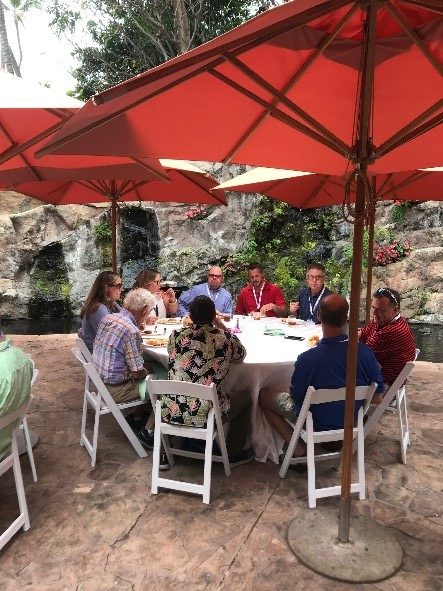
Peer review helped shape the course of success for GAI and can do the same for your firm. Gary also shared the benefits that he has derived from participating as a peer reviewer for other firms. If you are interested in having your firm peer reviewed or becoming a peer reviewer, contact Rich Johnson (rjohnson@bskassociates) Chairman of the Peer Review Committee.
Throughout the years, GBA members have not been afraid to share their most painful experiences with other members. The Spring Conference was no exception to this tradition. In a riveting presentation, “Hard Conversations: The Destructive Power of Conflict Avoidance and the Redemptive Power of Honesty” Aaron Mann and Michael Yost of Terracon, shared a story of an employee making extremely bad choices, facing the legal and client relationship jeopardy that ensued, and how due diligence and transparency in the aftermath limited the damage while preserving the firm’s excellent reputation. Their message emphasized the need for ethics awareness efforts within firms that go beyond just training. A similar story of redemption was shared by Martin LaRoche of SNC Lavalin as he presented his company’s harrowing journey from the red-ink depths of a 2012 corruption and collusion scandal, which led to the convictions and imprisonment of some executives, and how the firm returned to profitability. Martin explained that the company had a culture of silos when the trouble occurred and has emerged in the years since with new management and a centralized philosophy of “One Company.” Ethics and compliance have become the number one priority company wide. A recent GBA peer review was credited with helping Martin and his colleagues take more actions to sustain recent success.
The “Quadruple Bottom Line” (the four Ps: People + Planet + Profit + Purpose) approach to business was introduced in another inspirational presentation by Stuart Coleman. We were told the story of Rell Sunn, a legendary female surfer from Hawaii who dedicated her life to protecting the environment and the well-being of her community while fighting a horrible disease. Stuart cited B-Corporations as one path to achieving the 4 Ps and reminded us that the word “wealth” had its origins in the term “well-being”.
 Who says geoprofessionals aren’t funny? We were taught powerful communications techniques through the lessons of improvisational comedy by Nancy Watt, a Second City Conservatory Graduate. The session included audience participation in demonstrating that anyone can learn these techniques of effective communication and collaboration. It all starts with speaking and listening from a “Yes, and…” rather than a “Yes, but…” perspective. It also proved we have some real comedians among our members.
Who says geoprofessionals aren’t funny? We were taught powerful communications techniques through the lessons of improvisational comedy by Nancy Watt, a Second City Conservatory Graduate. The session included audience participation in demonstrating that anyone can learn these techniques of effective communication and collaboration. It all starts with speaking and listening from a “Yes, and…” rather than a “Yes, but…” perspective. It also proved we have some real comedians among our members.
Executives of GBA member firms often choose our conferences to share their insights on best practices to help others navigating the tricky waters of business leadership. Day 2 of the conference featured two presentations from executives who in this manner “paid forward” their appreciation of the value GBA has delivered to them and their firms through the years. The serious business of leadership transition was told from a fresh perspective by Bill Hadge, who recently completed his term as President/CEO of GZA GeoEnvironmental, Inc. Bill explained that he set a fixed 6-year term limit for his time in the executive seat. Bill shared his perspective on the many benefits and a few challenges related to this decision. His presentation reflected the grace and dedication of a true servant leader; a leadership journey well lived for the benefit of his firm.
Guy Marcozzi, President of Duffield Associates, Inc. presented a detailed methodology for “being Nostradamus” (i.e. better predicting the future), at least in terms of economic cycles. Guy encouraged us to believe that we have more knowledge about the future than we think we do, particularly if we are willing to crunch the numbers and pay attention to leading internal and external economic indicators. Perfection isn’t necessary or possible in predicting the future, but the presentation graphically pointed out the adage that when you’re being chased by a lion, you only need to outrun the other person being chased. This true for economic downturns as well. Guy recommended “Prosperity in the Age of Decline” by Beaulieu for more insight on this topic.
The culmination of a tremendous three days was the keynote presentation of Eric Saperston highlighting what it takes to be extraordinary. Eric has spent 25 years talking with some of the most accomplished and powerful people in the world. He explained that he was motivated by the calling to “Live in Wonder.” He encouraged us to tell hero stories, not victim stories and to practice the art of questioning to learn 3 things for deeper understanding, such as “What are 3 things that you would like to have told your younger self?” Eric’s many uplifting messages in this presentation included that we don’t stop playing because we get old, we get old because we stop playing. He also recalled the powerful lesson that he learned from former president Jimmy Carter, to never underestimate the power of the individual to make a difference in the world. Eric shared that what separates those who achieve and those who do not is in direct proportion to their ability to ask for help. We surmise that asking for help from the association is one reason GBA members have been so successful through the years. Eric’s presentation was a fitting end to this conference of celebrating our foundation and building our future.
As always, the attendees enjoyed the networking and fellowship of spending time together. The evening receptions and dinners were outstanding. We can’t wait to see everyone again later this year. We hope you are making plans to join us for the Fall Conference in Louisville, Kentucky where we will learn that “BIG DATA Means Big Opportunities.”
ARTHUR G. “ART” P.E., D.GE IS NEW GBA PRESIDENT
Arthur G. “Art” Hoffmann, P.E., D.GE (Gannett Fleming, Inc.)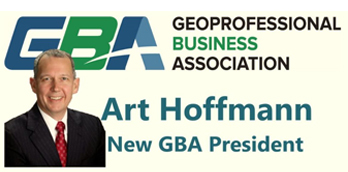
is the new president of the Geoprofessional Business
Association (GBA), a not-for-profit association of
geoprofessional firms. Accepting office during ceremonies
at GBA’s annual meeting in Wailea, Hawaii. Mr. Hoffmann
became the 49th individual to serve as GBA’s president and
chair the group’s board of directors. Other directors
who will serve during GBA’s 2019-2020 fiscal year are:
- President-Elect: Kenneth R. “Ken” Johnston (GZA GeoEnvironmental, Inc.)
- Secretary/Treasurer: Thomas W. “Tom” Blackburn, P.E., G.E., F. ASCE (Blackburn Consulting)
- Saiid Behboodi, P.E., G.E (PBS Engineering + Environmental)
- Chuck A. Gregory, P.E. (Terracon)
- Martin LaRoche, P. Eng, M.Sc. (SNC Lavalin)
- Christopher Matthew “Matt” Moler, P.E. (S&ME, Inc.)
- Matthew R. “Matt” Poirier, P.E. (Sanborn, Head & Associates, Inc.)
- Leo Titus, Jr., P.E. (ECS, Ltd.)
Mr. Hoffmann is a shareholder and Executive Vice President of Gannett Fleming, Inc. and serves as the Chief Administrative Officer and as a member of the Board of Directors. Art is responsible for Gannett Fleming’s corporate leadership programs and project management training programs. Prior to assuming this position, Art lead the 100 person Pittsburgh regional office. Art started the first geotechnical practice group in a regional office in Pittsburgh in 1992. He’s been with Gannett Fleming since 1986.
During GBA’s 2019 Spring Conference, Mr. Hoffmann thanked the Association Members for their confidence in his leadership, especially as GBA celebrates its 50th Anniversary under his leadership.
Emerging Contaminants
This emerging Contaminants Spotlight covers the topic of vapor intrusion. Although not an
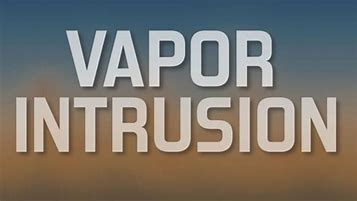
“emerging contaminant” per se, vapor intrusion, or VI, is a continuously evolving field as evidenced by changing standards for contaminants of concern, advances in sampling and analytical technologies, and better understanding of the variability of VI and its effects on indoor air concentrations with time.
Examples of each are discussed below.
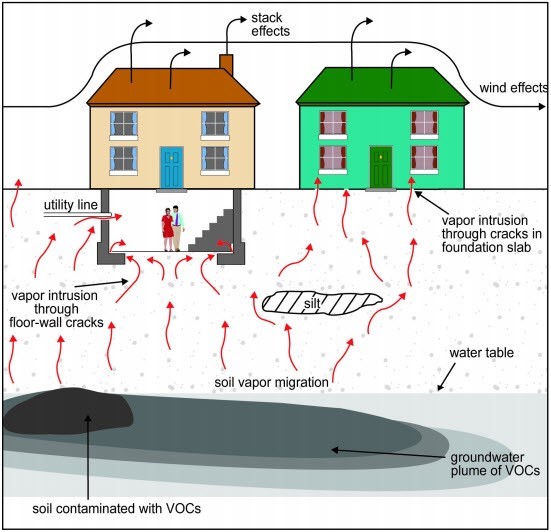
What is Vapor Intrusion?
Volatile contaminants in groundwater or soil form vapors that migrate upward through the soil column and enter an overlying structure through the foundation via joints, cracks, utility penetrations, etc. Once inside, the vapor can potentially reach concentration levels that become an inhalation hazard for human occupants. Common VI contaminants of concern include chlorinated solvents (e.g., tetrachloroethene [PCE] and trichloroethene [TCE]) and petroleum hydrocarbons (e.g.,benzene). While many VI issues are the result of environmental contamination, radon gas is an example of a naturally occurring VI hazard.
Changing Standards
In 2011, the USEPA released a toxicity profile for TCE that lowered the short-term inhalation reference concentration to 2 micrograms per cubic meter (µg/m3). This change caused many states to re-evaluate contaminated sites for TCE VI risk. Some states have adopted 2 µg/m3 as an indoor air remediation target for TCE and have developed imminent hazard levels only slightly higher. For example, the Massachusetts Department of Environmental Protection (MA DEP) established a residential imminent hazard TCE concentration of 6 µg/m3, above which immediate response actions must be taken to notify sensitive populations, notify MA DEP, and initiate response actions to eliminate the imminent hazard. Regulatory thresholds vary from state to state, and it is important to understand the regulatory thresholds in the states where you’re working.
Data Collection Challenges
Collecting representative indoor air quality data to accurately model or predict risk to human health can be challenging. A complicating factor in conducting VI assessments is the sometimes competing need to collect indoor air samples that are representative of both: 1) worst case VI conditions, and 2) potential long-term exposure.
Indoor air concentrations change on a continuous basis due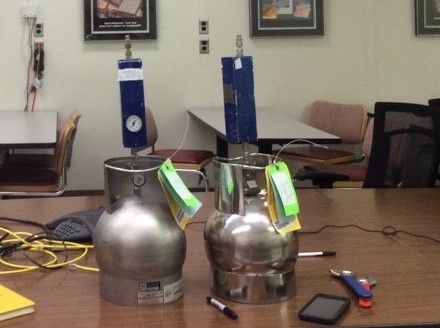 to many variables, including environmental condition (e.g. temperature, barometric pressure, wind, and precipitation), and building conditions (e.g., heating and cooling system operations, door and window positions). Another complicating factor of VI assessments is understanding whether indoor air contamination is a result background sources such as stored chemicals in the building, or even building materials. Thus, it is difficult to collect a single sample and draw conclusions about VI risk.
to many variables, including environmental condition (e.g. temperature, barometric pressure, wind, and precipitation), and building conditions (e.g., heating and cooling system operations, door and window positions). Another complicating factor of VI assessments is understanding whether indoor air contamination is a result background sources such as stored chemicals in the building, or even building materials. Thus, it is difficult to collect a single sample and draw conclusions about VI risk.
The USEPA is conducting research to better understand what parameters might best serve to guide indoor air sampling programs for VI assessment. Field screening equipment, such as portable gas chromatographs, can help with collecting peak and average values over time, as wells as evaluating  potential background vapor concerns in discrete areas of the building without the added costs of a mobile laboratory.
potential background vapor concerns in discrete areas of the building without the added costs of a mobile laboratory.
Where are the Opportunities to provide Consulting Services?
Environmental business opportunities related to VI continue to grow as regulatory attention grows. The assessment of vapor intrusion can be complex and variable. Regulations frequently change, and current standards and guidelines should be reviewed in the states where work is being conducted. Collecting a representative indoor air sample to assess VI can be a challenge given the variability of VI under different conditions. Advances in field instrumentation offer the opportunity to gain an improved understanding of the variability and potential sources of contamination in indoor air on a building-specific basis.
This article generously provided by GBA’s Environmental Business Council to benefit all geoprofessionals providing environmental consulting services. It was prepared by: Jennifer Sanborn, P.E.; Sanborn, Head & Associates, Inc.
(all images courtesy of Internet)
Additional Resources
USEPA Vapor Intrusion Webpage: https://www.epa.gov/vaporintrusion
Massachusetts Department of Environmental Protection, “US EPA Trichloroethylene Toxicity Values and Office of Research and Standards Recommendations Regarding Remediation Targets and Timeframes to Address Potential Developmental Risks”, August 15, 2014. https://www.mass.gov/files/documents/2016/08/pw/tcevalsm.pdf
GBA Announces the Formation of the Next Emerging Leaders Class
GBA is excited to announce the launching of the 4th Emerging Leaders Class in 2019. The Class will include 20 to 30 representatives of GBA member-firms that have high
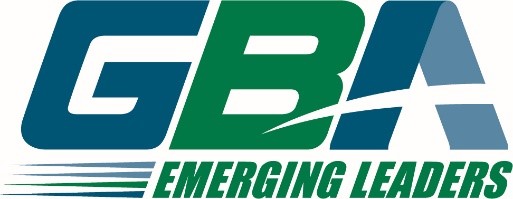 potential as consultants and business leaders. Our goal is to provide those future leaders with tools to accelerate their growth and unleash their potential through education, networking, and collaboration. While networking with other similar emerging leaders, each emerging leader will expand their knowledge through GBA’s unique business-education resources associated with risk management and business performance optimization.
potential as consultants and business leaders. Our goal is to provide those future leaders with tools to accelerate their growth and unleash their potential through education, networking, and collaboration. While networking with other similar emerging leaders, each emerging leader will expand their knowledge through GBA’s unique business-education resources associated with risk management and business performance optimization.
GBA’s previous Emerging Leaders classes have been highly regarded for the leadership growth of the participants and for their contributions to their firms and to our profession. This is an exceptional opportunity to unleash the potential of an Emerging Leader in your firm.
Emerging Leaders Class Testimonials Video
Benefits to Participants
-
- Participate in GBA’s bi-annual conferences (spring and fall each year), and the Winter Leadership Summit (January each year). These events bring together 150+ senior leaders of GBA member firms to learn about business risks, share best practices, and improve business performance.
- Build camaraderie with fellow class participants and GBA member firm representatives through outstanding networking opportunities.
- Complete specific tasks identified by the Emerging Leaders Class (could lead to creation of a white paper or presentation at an upcoming GBA conference).
- Become engaged with and contribute to existing GBA Committees or Councils, which may lead to future committee leadership responsibilities.
Benefits to GBA Member Firms
- Expose your Emerging Leaders to the wide array of GBA benefits and resources.
- Equip your Emerging Leaders with valuable insights and contacts from across the geoprofessional community.
- Optimize your Emerging Leaders performance and skillsets through interaction and training with other top-notch professionals.
- Expand your companies’ influence in GBA and pave the way for retiring personnel to pass the GBA torch to the next round of GBA leaders.
Commitment and Costs
Participants are expected to attend three GBA events each year, consisting of a Spring and Fall conference and the Winter Leadership Summit. These events are 2 to 3 days in length and incur costs associated with conference registrations, hotel, airfare, etc. In addition, periodic conference calls may also be required throughout the year.There are no fees associated with involvement in the Emerging Leaders Class.
Applications for GBA’s 4th Emerging Leaders Class will be accepted starting on April 4, 2019 and the first meeting of the group will take place October 3, 2019, immediately prior to our Fall Conference in Louisville, Kentucky. For more information, contact Joel Carson.
Hoffmann, Johnston, Blackburn Lead GBA’s 2019-20 Board of Directors Slate
GBA’s Nominating Committee has announced its slate of officers and directors for the May 1, 2019-April 30, 2020 fiscal year.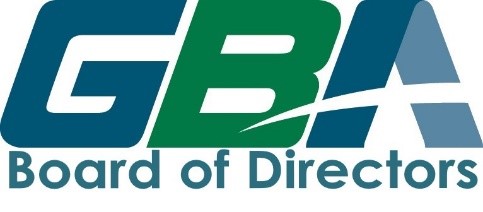 GBA President-Elect Arthur G. “Art” Hoffmann, P.E., D.GE (Gannett Fleming, Inc.) will become President and Chair of the GBA Board of Directors.
GBA President-Elect Arthur G. “Art” Hoffmann, P.E., D.GE (Gannett Fleming, Inc.) will become President and Chair of the GBA Board of Directors.
Those nominated for the other two officer positions are, for President-Elect and Board Chair-Elect, Kenneth R. “Ken” Johnston (GZA GeoEnvironmental, Inc.) and, Thomas W. “Tom” Blackburn, P.E., G.E., F. ASCE (Blackburn Consulting) for Secretary-Treasurer.
Those nominated to serve as Directors-at-Large are: Saiid Behboodi, P.E., P.G. (PBS Engineering and Environmental); Chuck A. Gregory, P.E. (Terracon); Martin LaRoche, P.Eng., M.Sc.(SNC Lavalin); Christopher Matthew “Matt” Moler, P.E. (S&ME, Inc.); Matthew R. “Matt” Poirier, P.E. (Sanborn, Head & Associates, Inc.) and Leo Titus, Jr., P.E.(ECS, Ltd.).
GBA’s Current Board of Directors
NEW CASE HISTORY Missed Historic Pipeline, Third Party Reliance, and New Employee Cost Member-Firm $800,000.
The GBA-Member Firm was retained by Client 1 to conduct a Phase I ESA on a 1000-acre tract of undeveloped land prior to the property sale. To save money, the client did not want the title information to be purchased from a third-party 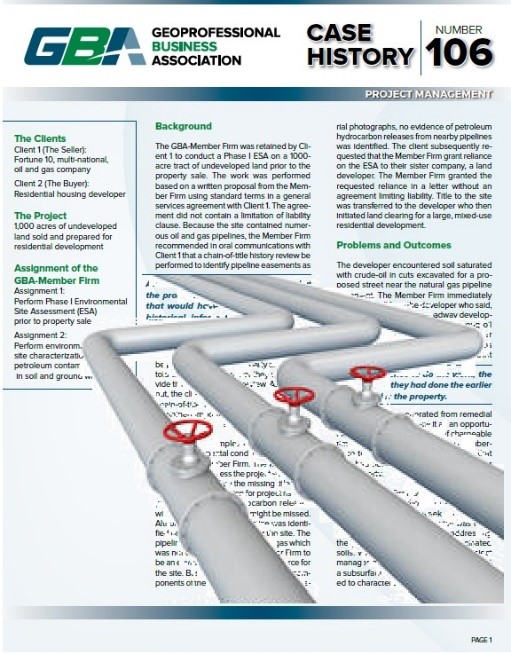 and instead told the Member Firm that they would provide title information for review.
and instead told the Member Firm that they would provide title information for review.
As it turned out, the client never provided the promised chain-of-title information that would have contained important historical information about pipeline easements.
Lessons Learned: This case history teaches six important lessons:
- It’s risky to work for both the seller and buyer of real estate.
- Inappropriate verbal communications can increase risk of liability.
- When the client agrees to provide important project information, make sure you receive it. And if you don’t, report it.
- Understand what scope is minimally acceptable to meet the project objectives.
- Check if your firm has done a previous study on or in the vicinity of a new project site.
- Make appropriate staff assignments
Comments of the GBA Member
The experience with this project caused the firm to rethink our approach for environmental assessment and remediation project opportunities. Out of bad came good as we implemented important changes in the following areas:
- Documentation: When critical project information is not provided by the client, we document in writing our attempts to obtain the information, the fact that the information was not received and the related risk implications.
- Third Party Reliance and Follow-on Work Requests: We developed a system to address requests for reliance and related follow-on work from third parties. The system includes a process for evaluating the quality and nature of our prior work at the subject site. The process also includes an assessment of the risk in granting reliance and accepting work from third parties as well as ways to mitigate risk if such reliance and additional work are accepted.
- New Hires: More emphasis has been placed on assuring that new hires are properly trained and oriented to the firm’s procedures, policies, and expectations. We make sure they have appropriate supervision in their early assignments and are not placed alone on projects with a client interface early in their tenure.
GBA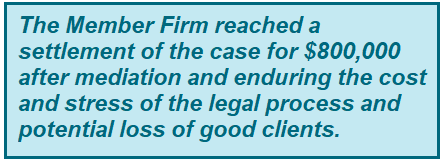 has a tradition of collaborating on issues that impact the geoprofessions through GBA Case Histories. GBA Case Histories provide unprecedented real-world learning examples related to project and business management. Learn where others went wrong, how they handled their problems, and how you can learn from their experiences to avoid the same problems in the future.
has a tradition of collaborating on issues that impact the geoprofessions through GBA Case Histories. GBA Case Histories provide unprecedented real-world learning examples related to project and business management. Learn where others went wrong, how they handled their problems, and how you can learn from their experiences to avoid the same problems in the future.
GBA Case Histories are FREE to all members.
United States Society on Dams (USSD) Endorses GBA’s PROPOSED BEST PRACTICES FOR THE ENGINEER OF RECORD FOR TAILINGS DAMS

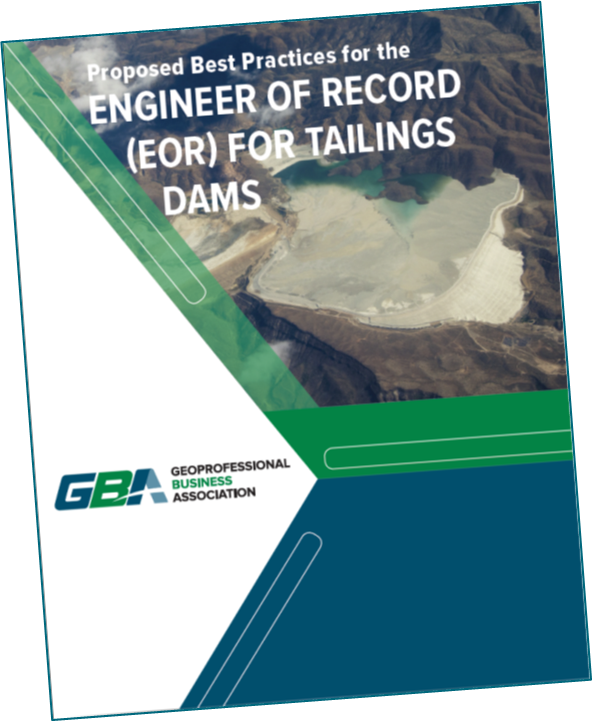 In February 2019, the United States Society on Dams (USSD) announced their endorsement of GBA’s recently published Proposed Best practices for the Engineer of Record (EOR) for Tailings Dams.
In February 2019, the United States Society on Dams (USSD) announced their endorsement of GBA’s recently published Proposed Best practices for the Engineer of Record (EOR) for Tailings Dams.
Their endorsement stated, “USSD views this Proposed Best Practices for the Engineer of Record for Tailings Dams guidance document prepared by the Geoprofessional Business Association (GBA) as a comprehensive guidance document on the subject of the Engineer of Record for tailings storage facilities for the mining industry as a whole. The opportunity for USSD to collaborate with the GBA to review and provide input to the guidance document was appreciated. USSD endorses this document as a critical reference document for the industry.”
Read More: https://www.ussdams.org/about/position-statements/
GBA Releases Five More Case Histories
GBA Releases Five More Case Histories: 51-55
GBA Publications Committee
Learn from others. Don’t repeat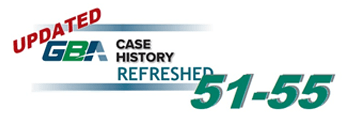 the mistakes of the past! GBA Case Histories are being used by our members for loss prevention discussions in support of professional development and mentoring.That is why GBA case histories are so valuable, and why GBA is updating them all, while adding new ones, too. We are halfway there as five more case histories have been re-issued.
the mistakes of the past! GBA Case Histories are being used by our members for loss prevention discussions in support of professional development and mentoring.That is why GBA case histories are so valuable, and why GBA is updating them all, while adding new ones, too. We are halfway there as five more case histories have been re-issued.
CASE HISTORY NO. 51 (download)
A complicated 70-acre riverside project with “Bay mud”, became more challenging when the excavation contractor and project civil engineer ignored the advice of the Member Firm and the client sued the Member Firm for negligence that caused $2.5 million in damages.
 Although the Member Firm’s CEO got personally involved and “saved the day,” serious problems arose. The firm had to pay $350,000 to extricate itself, because a judge or jury probably would not have understood the technical intricacies that proved the member was blameless.
Although the Member Firm’s CEO got personally involved and “saved the day,” serious problems arose. The firm had to pay $350,000 to extricate itself, because a judge or jury probably would not have understood the technical intricacies that proved the member was blameless.
CASE HISTORY NO. 52 (download)
The Member Firm was accused of an error it did not make on a very small project, but its survey crew inadvertently said the firm was at fault. The survey crew chief’s remark, overheard by others, resulted in the firm having to pay a $125,000 award.
CASE HISTORY NO. 53 (download)
A GBA member performing bridge design ran afoul of changed conditions in a small area, causing failure of post-tensioning anchors. Nonbinding ADR – resolution by experts – was used to resolve the original dispute quickly and satisfactorily
CASE HISTORY NO. 54 (download)
A Member Firm had to spend almost two million uninsured dollars to extricate  itself from a football stadium rebuilding project. Problems arose when its original recommendations were not followed. The firm was unaware of certain changes that were made, but casual language in a report made that position difficult to defend.
itself from a football stadium rebuilding project. Problems arose when its original recommendations were not followed. The firm was unaware of certain changes that were made, but casual language in a report made that position difficult to defend.
CASE HISTORY NO. 55 (download)
The GBA member, an environmental consultant, performed quickly, at the client’s request, to facilitate a sale. As predicted, more contamination was discovered, but the client claimed the consultant had failed to perform the work it said it would, in a timely fashion. The consultant forfeited its $40,000 fee in exchange for a settlement.
GBA Case Histories are FREE to all Members. Access all GBA’s Case Histories HERE
Winter Leadership Summit – Success!
Winter Leadership Summit – SUCCESS!
GBA held its annual Winter Leadership Summit on January 25-27, 2019 and it was a big success. Fifty-five leaders from 35 Member Firms convened in Denver to collaborate on projects to benefit our members and identify ways Committees can improve and better serve our Association. We were joined by leaders from Engineers Without Borders who led a workshop titled, Leading Volunteer Groups to Greatness. At the conclusion of the meeting, the GBA leaders had the opportunity to network during a Tailgate Party.
Please visit GBA’s Facebook Page for photos of the weekend. Winter Leadership Summit Photos
Two Legal Documents Updated
The Geoprofessional Business Association (GBA) has published new editions of two important legal references, both prepared for design professionals without use of “legalese”; both available free of charge. Limitation-of-Liability Case Index and Economic-Loss-Doctrine Case Index were prepared for GBA’s Legal Affairs Committee by Seattle (WA) law firm Skellenger Bender, P.S.
GBA introduced the limitation-of-liability (LOL) concept to the design and environmental professions in 1969. By applying the concept, now upheld in most states, a client agrees to limit a design professional’s liability to a given amount, most commonly $50,000 or the fee, whichever is higher. The Index describes each case in terms of its background and the points or holdings involved, and – to support additional research – identifies the case by name, jurisdiction, and citation. The cases span the period 1956 to January 2019.
The economic loss doctrine (ELD), another important protection for design professionals, bars use of tort claims (e.g., professional-negligence and negligent-misrepresentation claims) to recover purely economic losses, such as those stemming from property damage or construction delays. In states that uphold the ELD in full, claimants against design professionals may recover purely economic damages only via breach-of-contract suits, limiting claimants to design professionals’ clients. In other states, third parties, like constructors, can sue design professionals directly. Economic-Loss-Doctrine Case Index provides a state-by-state status report on the economic-loss doctrine, describing the cases involved and providing the additional information required for more research.
